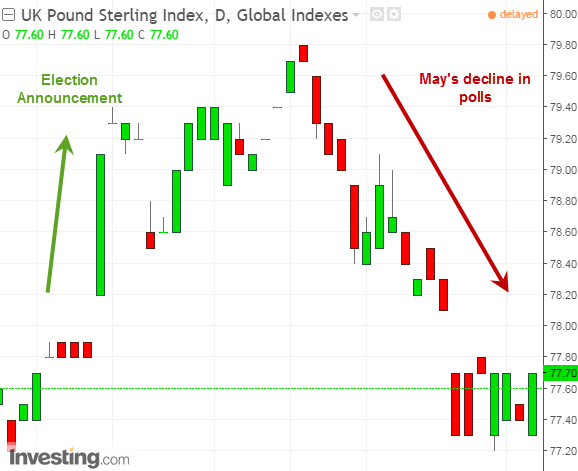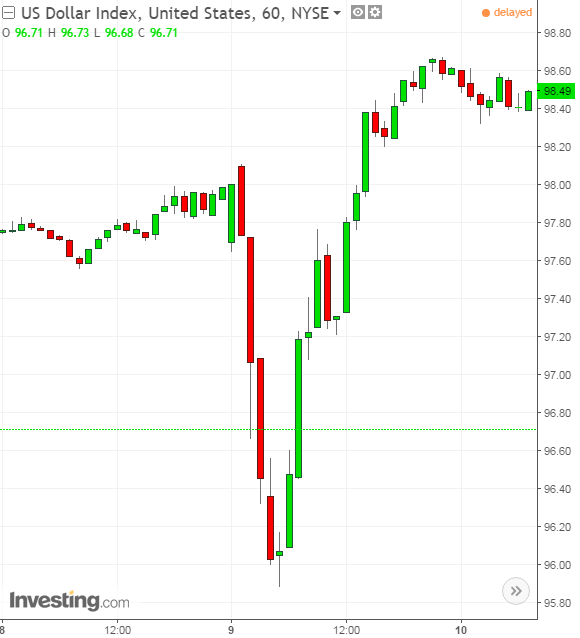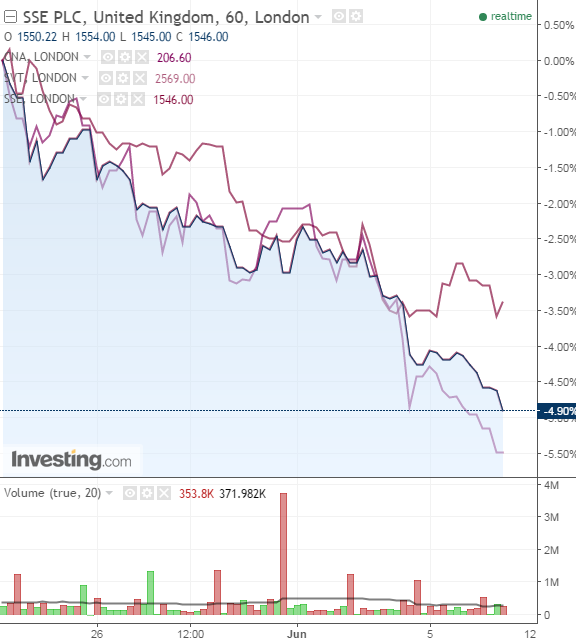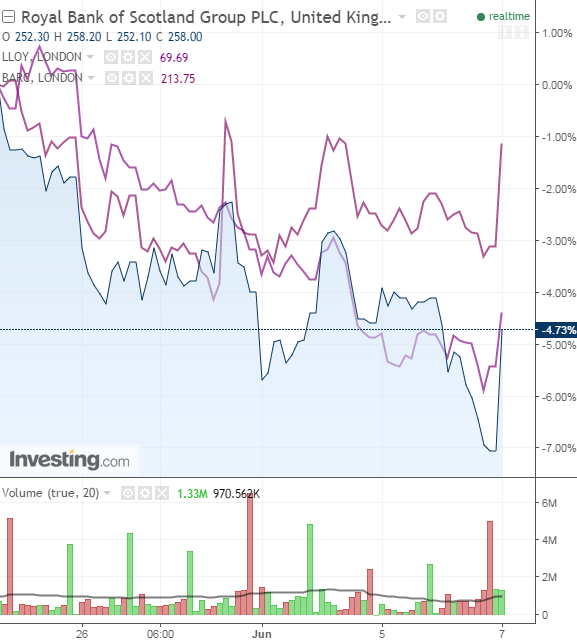by Clement Thibault
UK Prime Minister Theresa May's move in April, calling for a snap election in early June, seemed like a savvy tactic at the time. The PM, who had been appointed rather than elected, was looking to add to her party's parliamentary seats as well as enhance her legitimacy. The conservative Tories, with May at the helm, were leading by almost 18 points in initial polling, 43.2% versus 25.4% for Jeremy Corbyn's opposition Labour party.
Since then however, Labour has been narrowing the gap rather aggressively. While support for the Tories has stayed consistent, Labour's popularity has grown by 11 points over the past month and a half, leaving May's margin of error for Thursday's election at just under 7 percent. But in politics, as with so much else in life, it's never a done deal until the final voter tally has been officially released—a lesson painfully learned by global markets last June in the surprise aftermath of the UK’s own Brexit referendum, followed later last year in November, by Donald Trump's unexpected victory in the US presidential election.
Given that May represents the status quo, if she wins not much is expected to change. A hard Brexit will still be on the agenda and markets would be reassured by the stability her victory would represent.
But what if Corbyn and the Labour party come out on top?
Brexit Reversal In The Cards?
A Labour victory doesn't mean Brexit will be reversed. The UK's exit from its EU relationship was initiated by a referendum, so unless Labour wins over 50% of the vote, it cannot claim to have a legitimate mandate to reverse the referendum outcome. Two days after May's election announcement, Corbyn ruled out a second Brexit referendum, making it very unlikely that the UK will even try to reverse the process.
Aside from that, even if the UK wanted to stop the process, the legal and political framework for discussion is unclear, and would depend on the EU as much as—and maybe even more than—it depends on the UK.
What Labour would have control over, if they win, are the negotiations leading to Britain's exit from the EU. Sir Keir Starmer, Labour's projected lead negotiator in case of a victory, recently attacked May's approach to the negotiations, saying:
“She has taken lots of options off the table and really set a belligerent tone with our EU colleagues.”
Labour will try to secure a deal where the UK retains tariff-free access to the EU, while restricting access to its own territory. The EU, however, seems unlikely to agree to these terms.
What would a change in approach do the markets? The only certainty is uncertainty.
Weaker Pound
Uncertainty is always bad for the markets, whatever the assets traded. Always has been, always will be.
That's because uncertainty means relying on the unknown, which in turn brings out investor fear. It's not difficult, though, to predict one thing for sure: increased volatility, at least in the short-term.

Beyond that, we can only speculate—or draw examples from recent history. Looking at the UK Pound Sterling Index can help us gauge the currency's reaction to previous events.
When May announced the elections on April 18, the Index jumped 1.6% based on the announcement and polls. Victory was framed as a certainty, and the pound liked that.
Since then, as May's lead in the polls has been slowly shrinking, the Index has declined, reaching an even lower level than where it was the day before May's announcement. This would suggest that a Labour victory would hurt sterling.

The most recent political upset that rocked global markets was the election of the current US President. At that time, the US Dollar Index flash crashed on election day, November 8, plunging from 98.1 to 95.9 in a matter of hours. However, it soon recovered and went on to a 14-year high of 103.8 on January 3, 2017.
Equities: Winners And Losers
On the plus side for Labour, much like Trump's infrastructure agenda, Labour is promising a massive expansion in investment spending, which could indeed propel sterling higher. However—and this is where the similarities between Labour and the US Republican party significantly diverge—Trump and Corbyn hold radically different views on business. And the differences strongly forestall any possible comparison to the Trump victory's positive affects on the stock markets.
Republicans, particularly with Trump at the helm, are considered highly pro-business whereas Labour advocates for the re-nationalization of railways, water and energy industries, as well as the Royal Mail (LON:RMG) which is currently publicly traded. Moves toward nationalization have a tendency to frighten markets and put a damper on entrepreneurship, so a Corbyn victory would surely be detrimental to the FTSE and those companies that Labour wants to nationalize.

From an equities perspective, any nationalization moves would first harm the industries where the companies Labour is now eyeing operate—primarily utilities in this case. Power company National Grid (LON:NG) (electricity and natural gas distribution) has lost 6% in the past week; Centrica (LON:CNA) (gas) is down 5.5% over the past two weeks; SSE PLC (LON:SSE) (electricity) and Severn Trent (LON:SVT) (water) have lost 5% and 3.5% respectively.
The stronger the prospect of nationalization, the greater the market weakness for publicly traded UK utilities. This correlation (not to mention causation) is bound to continue and even deepen should Labour win Thursday's election.

Another sector at risk is banking. In general, the financial sector is not a favorite of the economic left in any case, but Shadow Chancellor John McDonnel said Labour would change banking laws to stop banks from closing local branches.
While this may or may not go through, the statement itself indicates that Labour has every intention of intervening in the financial arena. No surprise then that, much like utilities, banking is showing weakness. RBS (LON:RBS) is down about 5% in the past two weeks; so is Lloyds (LON:LLOY); Barclays (LON:BARC) is down just 1%.
Some might think that Labour's desire for a soft Brexit would calm market jitters, but we believe their domestic stance is integral to their agenda, and a victory tomorrow would allow them to implement their proposed reforms whereas Labour's conception of how EU negotiations might play out are unlikely to match actual reality.
Though tomorrow's election has frequently been compared to last year's Brexit vote, the stakes are much higher now for UK internal affairs. Brexit was a question of "If" followed by "How", which doesn't entirely depend on a single governing party and can be tolerated longer term by markets.
Tomorrow's victory will have a much stronger affect on markets. The party in power after tomorrow will control infrastructure spending, and their approach to business will determine where markets go long after the election is over.
